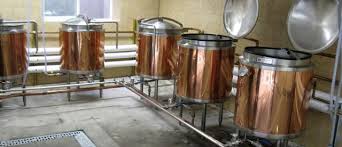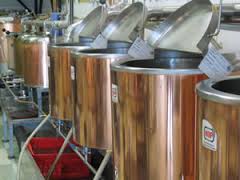Last week the Manitoba government announced that it is legalizing U-Brews, sometimes known as Brew-on-Premises. The idea behind U-Brews is to allow people to make their own beer and wine on the site of a commercial operation. They get access to professional equipment, advice and oversight from professionals and avoid the mess and storage of brewing at home.
Manitoba’s announcement leaves Alberta as one of the last hold-outs prohibiting on-site brewing. As usual.
Over the years I have been a big advocate of U-Brews. I believe they are a great way to open the world of homebrewing to the average person. Many people are simply overwhelmed at what it takes to brew beer or wine at home. I talk to people often who say “I would homebrew but…”. Their reasons usually revolve around the equipment needs, the mess, fear of contamination and/or lack of knowledge. U-Brews eliminate almost every one of those issues.
U-Brews can make homebrewing more accessible. I have family members who regularly make use of their local U-Brew (obviously not in Alberta) and they love it.
There is no question that U-Brews should be legal everywhere (are you listening new Alberta NDP government?). But I am starting to wonder if they really achieve what we veteran homebrewers desire. I have long felt that U-Brews are a good gateway option. People can start there and later they can move to their own at-home operation. I am not sure I believe that anymore.
As I look at other provinces, most notably Saskatchewan which is the most recent convert to U-Brews, I am no longer convinced they advance the homebrewing cause. In the flat province, most of the U-Brews focus exclusively on wine – beer is an afterthought. As I scan B.C. and Ontario, I find the same issue. Wine gets most of the air time. In both provinces beer has its adherents, but definitely wine is bigger.
Maybe that is fair enough. The consumer speaks. But, really, wine is much easier to make at home than beer. It has one ingredient, is less sensitive to sanitation issues and doesn’t need to be carbonated. Is making a batch of wine in a U-Brew store all that different than making it at home? Not really. Consumers seem to be choosing to bypass the relatively greater advantages of brewing beer in a commercial facility.
 My bigger question these days is whether U-Brews actually serve as a gateway to more serious homebrewing. I am beginning to think they don’t. The average U-Brew client wants an easy, quick, hassle-free approach to making their own beer. I am beginning to doubt that this person will ever make the jump to full-fledged homebrewing. Why should they? They pay a bit more for the U-Brew experience, but they gain tons in terms of convenience, ease and simplicity.
My bigger question these days is whether U-Brews actually serve as a gateway to more serious homebrewing. I am beginning to think they don’t. The average U-Brew client wants an easy, quick, hassle-free approach to making their own beer. I am beginning to doubt that this person will ever make the jump to full-fledged homebrewing. Why should they? They pay a bit more for the U-Brew experience, but they gain tons in terms of convenience, ease and simplicity.
Don’t get me wrong. I am not criticizing those people or the U-Brew shops that service them. The more ways to create your own beer the better is my motto. Which is why I still advocate for their legalization. I guess I am just finally shedding my own naivety around the role of U-Brews in the homebrewing community.
I am beginning to believe their function is akin to laminate floors. It gives you the look of a hardwood floor without the hassle of actually installing hardwood. There is nothing wrong with it, but it will never replace the feel of a real hardwood floor. U-Brews give you good tasting beer, but they lack the full satisfaction of doing the whole thing yourself.
Maybe I am in the minority, but I find the feeling at the end of a brew day to be unmatched anywhere. To know I constructed a nectar out of grain, water, hops and my own sweat is a pretty sweet thought. A U-Brew simply can’t replicate that.
So, congratulations to Manitoba for opening the door to U-Brews. But you will forgive me if after my applause I quickly return to my usual strategy of encouraging burgeoning homebrewers to join their local homebrew club, as that is the way to create a lifelong homebrewer.


May 29, 2015 at 7:56 AM
>”To know I constructed a nectar out of grain, water, hops and my own sweat is a pretty sweet thought”
Although it’s on a different scale, that’s exactly how I felt (and still feel) 25 years ago (!) when we started GW. The first day that our product hit the market, we parked outside the liquor stores and watched the customers coming out. And when someone was carrying one of MY beers, it was a feeling that could be best described as ‘giddy’. Somebody just bought a beer I made!
And to now be ranked the 3rd largest regional in Canada, when all we wanted to do was make a good beer and save our jobs, well, it’s not an easy thing to express. A quarter of a century ago, 16 ex-brewery employees, and their families, embarked on a high risk adventure down a path not travelled by many before us. But even though we endured twists and turns, potholes and detours, we continued to move forward to where we are today.
I really need to write a book about it…
June 4, 2015 at 9:57 AM
As home brewer in southwestern Ontario, I make all all grain batches at home in my garage regularly and rely heavily on my local u-brew store to can my beer and get ingredients for my next batch. I’ve never once brewed a batch there on site, but I think they along with other u-brew stores do offer value to the home brewing community for other reasons…
February 15, 2016 at 7:15 AM
I started home brewing in 1980 thereabouts whilst attending university in NS. I moved to Ontario in 1988 and greatly enjoyed making beer and wine at the U Brews there. I spent a few weekends in the Toronto area and later Lindsay – brewing up some quality suds. Now in my retirement years, I’ve gone from propane powered kettle partial grains and extracts to full grain electric with a Grainfather and its stainless accessories. U Brews and U Vints are to me like car wash services. Sometimes I go out to wash, other times at home. I’m glad U Brews and Vints are finally allowed but we are 30 years behind BC and Ontario.